
The Taiping Rebellion, also known as the Taiping Civil War or the Taiping Revolution, was a massive rebellion or civil war that was waged in China between the Manchu Qing dynasty and the Han, Hakka-led Taiping Heavenly Kingdom. It lasted from 1850 to 1864, although following the fall of Nanjing the last rebel army was not wiped out until 1871. After fighting the bloodiest civil war in world history, with 20 to 30 million dead, the established Qing government won decisively, although at a great price to its fiscal and political structure.

The New Armies, more fully called the Newly Created Army, was the modernised army corps formed under the Qing dynasty in December 1895, following its defeat in the First Sino-Japanese War. It was envisioned as militia fully trained and equipped according to Western standards. In 1903 an imperial edict expanded it to 36 divisions of 12,500 men each, or total of 450,000. It was known as the Beiyang Army, and was under the command of Yuan Shikai.
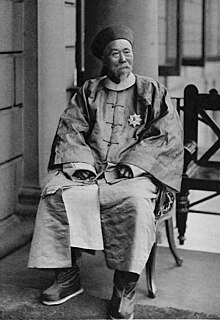
Li Hongzhang, Marquess Suyi was a Chinese politician, general and diplomat of the late Qing dynasty. He quelled several major rebellions and served in important positions in the Qing imperial court, including the Viceroy of Zhili, Huguang and Liangguang.

"The Internationale" is a left-wing anthem. It has been a standard of the socialist movement since the late nineteenth century, when the Second International adopted it as its official anthem. The title arises from the "First International", an alliance of workers which held a congress in 1864. The author of the anthem's lyrics, Eugène Pottier, an anarchist, attended this congress. In turn, the song was later set to an original melody composed by Pierre De Geyter, a Marxist.

The "Cup of Solid Gold", adopted by the Qing dynasty (1644–1912) on 4 October 1911, was the first official national anthem of China. The title wishes for the stability of the "golden cup," a ritual instrument that symbolized the empire. Six days after the anthem was adopted, however, the Wuchang Uprising took place and quickly led to the fall of the Qing. The "Cup of Solid Gold" was never performed publicly.

Historical Chinese anthems comprise a number of official and unofficial national anthems of China composed during the late 19th century and the early 20th century.
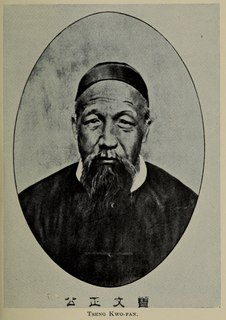
Zeng Guofan, Marquis Yiyong, birth name Zeng Zicheng, courtesy name Bohan, was a Chinese statesman and military general of the late Qing dynasty. He is best known for raising and organizing the Xiang Army to aid the Qing military in suppressing the Taiping Rebellion and restoring the stability of the Qing Empire. Along with other prominent figures such as Zuo Zongtang and Li Hongzhang of his time, Zeng set the scene for the Tongzhi Restoration, an attempt to arrest the decline of the Qing dynasty. Zeng was known for his strategic perception, administrative skill and noble personality on Confucian practice, but also for his ruthlessness in repressing rebellions.
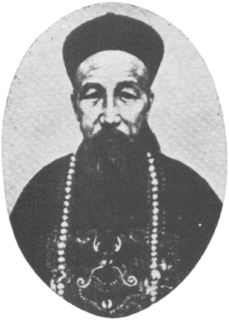
The Xiang Army or Hunan Army was a standing army organized by Zeng Guofan from existing regional and village militia forces called tuanlian to contain the Taiping Rebellion in Qing China. The name is taken from the Hunan region where the Army was raised. The Army was financed through local nobles and gentry, as opposed to through the centralized Manchu-led Qing dynasty. The army was mostly disbanded by Zeng after the re-capture of the Taiping capital at Nanking.
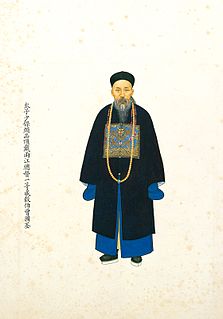
Zeng Guoquan, courtesy name Yuanfu, art name Shuchun, was a Chinese official and military leader of the late Qing dynasty. He was the ninth brother of Zeng Guofan, a prominent statesman and general, and a descendant of the philosopher Zengzi. He served in the Xiang Army, a standing military force organised by his brother to counter the Taiping rebels, and was nicknamed "Ninth Marshal" (九帥). He was known for his expertise in siege warfare, particularly the use of trenches, hence he was also nicknamed "Zeng the Iron Container" (曾鐵桶). During the conquest of Tianjing (Nanjing), the capital of the Taiping Heavenly Kingdom, Zeng was notorious for condoning massacres of the city populace, which resulted in him being called "Zeng the Butcher" (曾屠戶).
Bao Chao (1828–1886) was an eminent Han Chinese official, military Captain General, of the late Qing Dynasty in China. He raised the Xiang Army to fight effectively against the Taiping Rebellion and restored the stability of Qing Dynasty along with other prominent figures, including Zuo Zongtang and Zeng Guofan, setting the scene for the era later to fight against known as the "Nien Rebellion". He was known for his military perception.
Jiangnan Daying (Chinese: 江南大營 or the Jiangnan Battalion; was an army group assembled by the Qing dynasty. The army group consist of mostly Green Standard Army, and their goal was to quell the Taiping Rebellion around the Jiangnan region. The army group twice encircled Nanjing, the capital of the Taiping Heavenly Kingdom, but were defeated by the Taiping forces on both occasions.

The Hunanese people or Xiang-speaking Chinese are a Xiang-speaking Han Chinese ethnic subgroup originating from Hunan province in Southern China, but Xiang-speaking people are also found in the adjacent provinces of Guangxi and Guizhou.
The History of Song or Song Shi is one of the official Chinese historical works known as the Twenty-Four Histories of China that records the history of the Song dynasty (960–1279). It was commissioned in 1343 and compiled under the direction of First Minister Toqto'a and Prime Minister Alutu during the Yuan dynasty (1271–1368) at the same time as the History of Liao and the History of Jin. Running to a total of 496 chapters, the History of Song includes biographies of the Song Emperors along with contemporary records and biographical sketches of Song dynasty politicians, soldiers and philosophers.

The flag of the Qing dynasty was an emblem adopted in the late 19th century featuring the Azure Dragon on a plain yellow field with the red flaming pearl in the upper left corner. It became the first national flag of China and is usually referred to as the "Yellow Dragon Flag".

The Qing dynasty (1636–1912) was established by conquest and maintained by armed force. The founding emperors personally organized and led the armies, and the continued cultural and political legitimacy of the dynasty depended on the ability to defend the country from invasion and expand its territory. Therefore, military institutions, leadership, and finance were fundamental to the dynasty's initial success and ultimate decay. The early military system centered on the Eight Banners, a hybrid institution that also played social, economic, and political roles. The Banner system was developed on an informal basis as early as 1601, and formally established in 1615 by Jurchen leader Nurhaci (1559–1626), the retrospectively recognized founder of the Qing. His son Hong Taiji (1592–1643), who renamed the Jurchens "Manchus," created eight Mongol banners to mirror the Manchu ones and eight "Han-martial" banners manned by Chinese who surrendered to the Qing before the full-fledged conquest of China proper began in 1644. After 1644, the Ming Chinese troops that surrendered to the Qing were integrated into the Green Standard Army, a corps that eventually outnumbered the Banners by three to one.

Zeng Xianzhi was a Chinese revolutionary and politician.
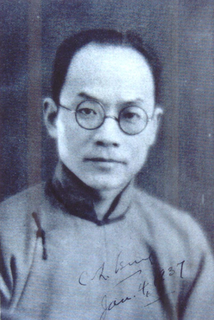
Zeng Zhaolun, also known as Chao-Lun Tseng, was a Chinese chemist and politician who served as vice-minister of Education after the establishment of the Communist State in the 1950s. He was an academician of the Chinese Academy of Sciences (CAS).

The 50th anniversary of the founding of the People's Republic of China took place on 1 October 1999. A military parade was held in Tiananmen Square in Beijing and various celebrations were conducted all over the country. China's paramount leader Jiang Zemin inspected the troops along Chang'an Avenue in Beijing. This parade was immediately followed by a civilian parade.
The People's Liberation Army in China has five rank schemes among different military branches, including Ground Force, Navy, Air Force, Rocket Force, Strategic Support Force.The Surface Force, Submarine Force, Coastal Defense Force, Marine Corps and Naval Air Force, although being a part of the Navy, maintains a different insignia to other naval fleet personnel.













